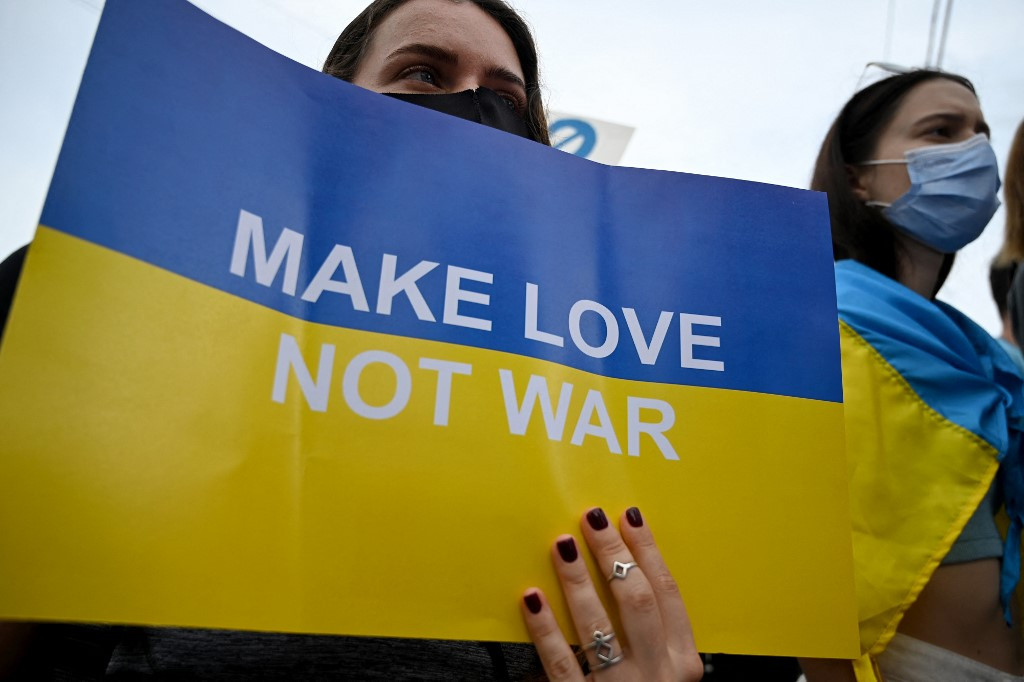Popular Reads
Top Results
Can't find what you're looking for?
View all search resultsPopular Reads
Top Results
Can't find what you're looking for?
View all search resultsRI seeks middle ground in Russia-Ukraine war
Indonesia has found itself caught in a tug-of-war between Russian and Ukrainian diplomatic efforts that aim to control the public perception of the Russian invasion of Ukraine.
Change text size
Gift Premium Articles
to Anyone
I
ndonesia has found itself caught in the middle of a tense diplomatic struggle over the Russian invasion of Ukraine, with the two sides competing for support as Jakarta’s first crack at chairing the Group of 20 (G20) biggest economies is beset by calls to remove Moscow from the exclusive club.
A month ago, Russia deployed tens of thousands of troops into neighboring Ukraine in a so-called “special operation” that has sparked widespread condemnation and protests in many countries, including from Russians themselves.
And while Ukrainian forces continued to mount a stiff resistance, the aggression has resulted in what Ukrainian Ambassador to Indonesia Vasyl Hamianin called a “real humanitarian catastrophe” with thousands of civilians killed or injured in the span of just a few weeks.
Following a stalemate at the United Nations Security Council, where Moscow vetoed any attempt to deal it crippling sanctions, efforts by Western powers to punish Russia have spilled over into other international fora, putting Indonesia’s own plans for the G20 at stake.
Indonesia’s southern neighbor Australia has already expressed reluctance to attend the G20 summit, with Prime Minister Scott Morrison reportedly saying the idea of sitting at the table with Putin was “a step too far”.
The Russian leader previously attended the G20 summit hosted by Australia in Brisbane in 2014, after the Russian annexation of the Crimean Peninsula from Ukraine.
Putin had already been invited to the G20 Summit and he intends to be there, Russian Ambassador to Indonesia Lyudmila Vorobieva said earlier this week.
Pressure was not only being applied at the level of the global political elite; both sides of the European war were also engaged in a tug-of-war for influence over the grassroots and religious elite of a country situated more than 13,000 kilometers away from the conflict.
Two weeks after the invasion, Ukraine’s Hamianin met with the leader of Nahdlatul Ulama (NU), Indonesia’s biggest grassroots Muslim organization, in search of support.
NU chairman Yahya Cholil Staquf said the group would do “whatever it takes to help”, according to a statement published on the NU website at the time.
A day later, however, Staquf quickly acknowledged the complexity of the situation after meeting Vorobieva.
Later that week, Hamianin met with the leadership of Muhammadiyah, the country’s second-largest Muslim organization, to capture more support for Ukraine. The group has since called on the government to be more proactive in finding a solution to the crisis.
Despite chairing the G20 and condemning the hostilities in Ukraine, Indonesia had resolved not to antagonize Russia, a major source of its imported metals and mineral fuels.
Read also: Putin ‘wants’ to attend G20 summit despite potential boycott
Indonesia’s G20 co-sherpa, Dian Triansyah Djani, said on Thursday that the country would continue to adhere to the rules of procedure and precedents set by previous G20 presidents to invite all members. The government had sent “save the date” invitations to all members on Feb. 22.
“Our position is quite clear, the presidency [...] will carry out its duties to be an impartial president,” he told reporters in an online press conference on Thursday.
Jakarta’s lukewarm response has sparked much critical analysis, from discussions on Indonesians’ perceived social media support for Moscow, to what some analysts alleged as a form of misplaced apathy for Cold War politics.
British Ambassador to Indonesia Owen Jenkins set up a discussion with reporters on Wednesday to warn that Putin's war came with “a wave of disinformation”.
“The Russian state is waging an aggressive information campaign to try to undermine support internationally for Ukraine,” he told reporters.
That same day, Russia’s envoy leveled the same accusation at some Western media.
But international relations expert Radityo Dharmaputra said it would be tricky for the United States and its Western allies to rally support in Indonesia, where anti-West sentiment remained a constant undercurrent.
He said, however, that Russian and Ukrainian attempts to influence Indonesia’s religious figures were an important development.
“We know that Indonesia’s foreign policy is largely shaped by elite groups. The ambassadors’ attempts to meet with the leaders of NU, Muhammadiyah and major mass media was aimed at that. Their position, in particular Islamic figures, is crucial,” said the PhD candidate from the University of Tartu in Estonia.
Separately, Golkar Party lawmaker Dave Laksono, who serves on the House of Representatives Commission I overseeing foreign affairs, said Indonesia should not feel pressured by other countries vying for its support.
“The government needs to do some proper deliberation, because it would be Western countries who lose out if they don’t attend [the G20 Summit]. They use the economic forum to push their own agenda when they could have used it as an opportunity to talk directly to Putin,” he told The Jakarta Post on Thursday.










